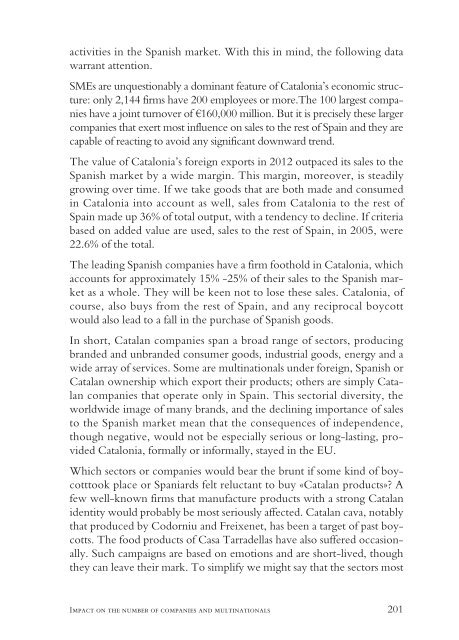The Economy of Catalonia
the_economy_of_catalonia._questions_and_answers_on_the_economic_impact_of_independence
the_economy_of_catalonia._questions_and_answers_on_the_economic_impact_of_independence
You also want an ePaper? Increase the reach of your titles
YUMPU automatically turns print PDFs into web optimized ePapers that Google loves.
activities in the Spanish market. With this in mind, the following data<br />
warrant attention.<br />
SMEs are unquestionably a dominant feature <strong>of</strong> <strong>Catalonia</strong>’s economic structure:<br />
only 2,144 firms have 200 employees or more.<strong>The</strong> 100 largest companies<br />
have a joint turnover <strong>of</strong> €160,000 million. But it is precisely these larger<br />
companies that exert most influence on sales to the rest <strong>of</strong> Spain and they are<br />
capable <strong>of</strong> reacting to avoid any significant downward trend.<br />
<strong>The</strong> value <strong>of</strong> <strong>Catalonia</strong>’s foreign exports in 2012 outpaced its sales to the<br />
Spanish market by a wide margin. This margin, moreover, is steadily<br />
growing over time. If we take goods that are both made and consumed<br />
in <strong>Catalonia</strong> into account as well, sales from <strong>Catalonia</strong> to the rest <strong>of</strong><br />
Spain made up 36% <strong>of</strong> total output, with a tendency to decline. If criteria<br />
based on added value are used, sales to the rest <strong>of</strong> Spain, in 2005, were<br />
22.6% <strong>of</strong> the total.<br />
<strong>The</strong> leading Spanish companies have a firm foothold in <strong>Catalonia</strong>, which<br />
accounts for approximately 15% -25% <strong>of</strong> their sales to the Spanish market<br />
as a whole. <strong>The</strong>y will be keen not to lose these sales. <strong>Catalonia</strong>, <strong>of</strong><br />
course, also buys from the rest <strong>of</strong> Spain, and any reciprocal boycott<br />
would also lead to a fall in the purchase <strong>of</strong> Spanish goods.<br />
In short, Catalan companies span a broad range <strong>of</strong> sectors, producing<br />
branded and unbranded consumer goods, industrial goods, energy and a<br />
wide array <strong>of</strong> services. Some are multinationals under foreign, Spanish or<br />
Catalan ownership which export their products; others are simply Catalan<br />
companies that operate only in Spain. This sectorial diversity, the<br />
worldwide image <strong>of</strong> many brands, and the declining importance <strong>of</strong> sales<br />
to the Spanish market mean that the consequences <strong>of</strong> independence,<br />
though negative, would not be especially serious or long-lasting, provided<br />
<strong>Catalonia</strong>, formally or informally, stayed in the EU.<br />
Which sectors or companies would bear the brunt if some kind <strong>of</strong> boycotttook<br />
place or Spaniards felt reluctant to buy «Catalan products»? A<br />
few well-known firms that manufacture products with a strong Catalan<br />
identity would probably be most seriously affected. Catalan cava, notably<br />
that produced by Codorniu and Freixenet, has been a target <strong>of</strong> past boycotts.<br />
<strong>The</strong> food products <strong>of</strong> Casa Tarradellas have also suffered occasionally.<br />
Such campaigns are based on emotions and are short-lived, though<br />
they can leave their mark. To simplify we might say that the sectors most<br />
Impact on the number <strong>of</strong> companies and multinationals 201


